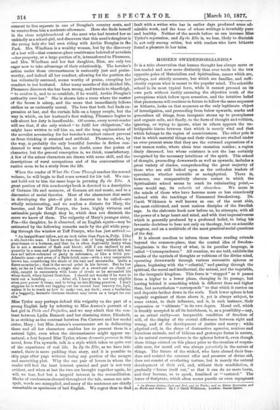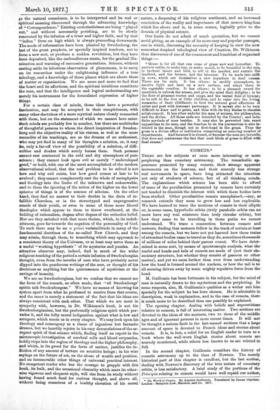MODERN SWEDENBORGIANISM.*
IT is a trite observation that human thought has always more or less tended and now more distinctly than ever tends to the two opposite poles of Materialism and Spiritualism, names which are, perhaps, not strictly accurate, but which are familiar, and suffi- ciently express what is meant to the popular mind. The scientific
school in its most typical form, while it cannot proceed on its own path without tacitly assuming the objective truth of the perceptions which follow upon sensation, and the intuitive belief that phenomena will continue in future to follow the same sequence as hitherto, looks on that sequence as the only legitimate object
of investigation, and proceeding from below upwards, marks and generalises all things, from inorganic atoms up to protoplasms and organic cells, and finally, to the facts of thought and volition, ignoring, or trying to ignore, what to others appears the us- bridgeable hiatus between that which is merely vital and that which belongs to the region of consciousness. The other pole is that in which material things and their changes are studied under an ever-present sense that they are the outward expressions of a vast unseen realm, where alone true causation resides ; a region dimly discerned, but whose existence is not the less certainly recognised by the necessary intuitions of the spirit. This school of thought, proceeding downwards as well as upwards, includes a
great variety of shades, comprehending the great majority of those who are still looked upon as the orthodox leaders of speculation whether scientific or metaphysical. There is,
however, one comparatively obscure corner in which the Spiritualistic school seems to reach its culminating point,— some would say, its reductio ad absurdum. We mean in the minds of those who have become more or less consciously imbued with the teachings of Emmanuel Swedenborg. Dr. Garth Wilkinson is well known as one of the most able, the most cultivated, and most zealous disciples of the Swedish sage. In the elaborate book now before us, he attempts, with all the power of a large heart and mind, and with that impressiveness which is generally produced by a profound belief, to bring his favourite doctrines to bear not only on theology, but on scientific progress, and on a multitude of the most practical social questions of the day.
It is almost needless to inform those whose reading extends beyond the common-place, that the central idea of Sweden- borgianism is the theory of what, in its peculiar language, is called "Correspondence." All creation, we are told, exhibits the results of the myriads of thoughts or volitions of the divine mind, operating downwards through various successive spheres or planes, beginning with the "celestial," and passing through the spiritual, the moral and intellectual, the animal, and the vegetable, to the inorganic kingdom. This force is " stopped " as it passes from a higher to a lower plane, changing in its passage, but leaving behind it something which is different from and higher than, but nevertheless " corresponds " to that which it carries on and deposits farther down in the scale. Each lower sphere is but vaguely cognisant of those above it, yet is always subject, to some extent, to their influence, and is, in each instance, their expression or " ultimate " in its own degree. Moral evil, which is frankly accepted in all its hatefulness, is, as a possibility—nay, as an actual entity—an inseparable condition of freedom of will, of the display of the eternal difference between right and wrong, and of the development of justice and mercy ; while physical evil, in the shape of destructive agencies, noxious and ferocious animals, and of hideous and grotesque forms in nature, is its natural correspondence in the spheres below it, even though these things existed on this planet prior to the creation of respon- sible man, for moral evil was always potentially in the nature of things. The future of the wicked, who have abused their free- dom and resisted the constant offer and pressure of divine aid, does not consist of everlasting torture, but is merely the natural development of their evil, and, without their annihilation, it gradually "burns itself out," so that it can do no more harm, and they become, so to speak, fossilised or " vastated." The- letter of Scripture, which often seems puerile or even repugnant • On Human Science., Good and Eril, and its Works; and on Divine Revelation and its Works and Sciences. By J. J. Garth Wilkinson, London : James Spier&
to the natural conscience, is to be interpreted and its real or spiritual meaning discovered through the advancing knowledge of "Correspondence." Existing ecclesiasticisms are being "played out," and without necessarily perishing, are to be slowly renovated by the infusion of a truer and higher faith, and by that " influx " from on high which is always proceeding downwards. The seeds of reformation have been planted by Swedenborg, the last of the great prophets, or specially inspired teachers, not to form a new sect, or produce a sudden revolution, but they have been deposited, like the carboniferous strata, for the gradual illu- mination and warming of successive generations. Science, without casting aside its laborious observation of phenomena, is to carry On its researches under the enlightening influence of a true teleology, and a knowledge of those planes which are above those of matter or organisation. We are more and more to feel that the heart and its affections, and the spiritual intuitions constitute the man, and that the intelligence and logical understanding are Stierely his instruments for the formulated expression of higher things.
For a certain class of minds, these ideas have a powerful fascination, and may be accepted in their completeness, with Many other doctrines of a more mystical nature closely connected with them, but on the statement of which we cannot here enter. Such minds are probably few in number, but there are multitudes of thoughtful persons to whom the direct inspiration of Sweden- borg and the objective reality of his visions, as well as the more recondite of his teachings, are as the dreams of an enthusiast, who may yet find in many of his thoughts a solution, or, it may be, only a far-off view of the possibility of a solution, of diffi- culties and doubts which sorely harass them. Such persons (Minuet rest contented in the cold and dry atmosphere of pure science ; they cannot look upon evil as merely "undeveloped good," or hold, with one of the most accomplished of the modern observational school, that the real problem to be solved is not how and why evil exists, but how good comes at last to be evolved ; they cannot complacently cast the whole of metaphysics and theology into the limbo of the unknown and unknowable, and to them the ignoring of the action of the higher on the lower epheres of things is of the essence of atheism. On the other hand, they find no answer to their doubts in the dicta of in- fallible Churches, or in the stereotyped and unprogressive creeds of their youth, or even in some of those more liberal theologies which appear to them to throw overboard, at the bidding of rationalism, dogma after dogma of the orthodox belief. Nor are they satisfied with that mere theism, which, in its indefi- niteness, goes far towards the negation of the personality of God. To such there may be an a priori verisimilitude in many of the fundamental doctrines of the so-called New Church, and they way attain, through them, to something which may approach to a consistent theory of the Universe, or at least may serve them as a useful "working hypothesis" of its mysteries and puzzles. An attentive observer may, indeed, find in much of the wider religious teaching of the period a certain infusion of Swedenborgian thought, even from the mouths of men who have probably never dipped into the ponderous writings of the seer, or thought of his doctrines as anything but the quintessence of mysticism or the ravings of insanity.
We are no Swedenborgians, but we confess that we cannot see the force of the remark, so often made, that "all Swedenborgs' spirits talk Swedenborgese." We have no means of knowing his system apart from what he professed to receive from that source, and the sneer is merely a statement of the fact that his ideas are always consistent with each other. That which we are most in sympathy with, however, in Dr. Wilkinson's book, is not his Swedenborgianism, but the profoundly religious spirit which per- vades it, and the lofty moral indignation against what is low and arrogant, which meets us in every chapter. We may look upon his theology and cosmogony as a tissue of ingenious but fantastic dreams, but we heartily rejoice in his racy denunciations of the ar- rogant spirit of that science which, finding itself an expert in the microscopic investigation of cerebral cells and blood corpuscles, boldly steps into the region of theology and the higher philosophy, and which, in its greed for the facts of matter, justifies the in- fliction of any amount of torture on sensitive beings ; in his wise sayings on the future of art, on the abuse of wealth and position, and on innumerable other things of universal practical interest. No competent reader who has the courage to grapple with this book, its bulk, and the occasional obscurity which mars its other- wise vigorous and eloquent style, will rise from its study without having found much food for curious thought, and above all, without being conscious of a healthy elevation of his moral
nature, a deepening of his religious sentiment, and an increased conviction of the reality and importance of that .unseen kingdom which lies above and is, in some senses, logically prior to the domain of physical science.
Our limits do not admit of much quotation, but we cannot avoid giving, as an example of its more easy and popular passages, one in which, discussing the necessity of keeping in view the now somewhat despised teleological view of Creation, Dr. Wilkinson thus discourses of one of the commonest and humblest of organised things ;— " Grass is for all that can come of grass now and hereafter. To pasture cattle, to make hay, to make mould, to be beautiful to the eye, to harbour insect and bird, to sell in the market, and sustain the landlord, and the farmer, and the labourer. To be made into milk in cows, which are themselves a new departure in final causes. These are its ends. It has others: to modify atmosphere, to receive light and heat on a new surface, and adapt them to the vegetable creation. It has others to be a pleasant sward for mankind, to refresh the senses, and give the mind their delights ; to be the floor of pleasant stories and songs, and the tented field of hymns; to be soft to the feet of little children, and to enter into the loving memories of their childhood ; to feed the natural good affections of artist and poet with innocent pasturage. It is meant also to be very difficult to draw and to paint, and thus with its tiny blades to chastiee artist-conceit. It has other ends for the man of mimes, the philosopher, and the divine. All these ends are intended by the Creator ; and inde- finite myriads of uses besides. It may also be perverted into exact oppositions to its uses, and the freedom to do the perversions is also in- tended in the man, though not at first-hand in the grass. Thus the grass is a divine office or institution comprising an amazing number el departments. And bemuse it is abused, or because the uses are juvenile, that does not contravene the fact that each blade of grass is filled with final causes."



































 Previous page
Previous page